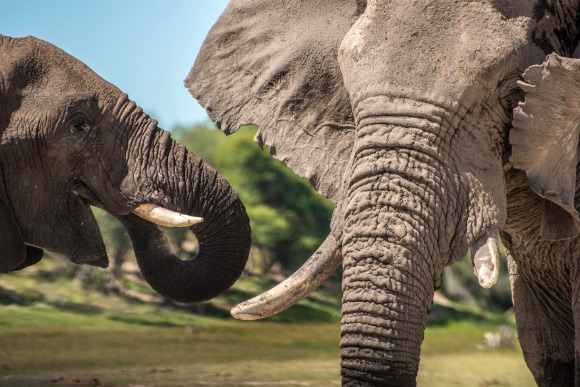By analyzing leadership patterns of all-male African savannah elephant (Loxodonta africana) traveling groups along elephant pathways in the Makgadikgadi Pans National Park, Botswana, a team of researchers from the Centre for Research in Animal Behaviour at the University of Exeter found that the oldest bulls were more likely to lead collective movements.

A young adolescent next to an older male African savannah elephant (Loxodonta africana) in the Makgadikgadi Pans National Park, Botswana. Image credit: Connie Allen.
“Our results challenge the assumption that older male elephants are redundant in the population and raise concerns over the removal of old bulls that currently occurs in both legal trophy hunting and illegal poaching,” said Dr. Connie Allen, lead author of the study.
“We argue that selective hunting of old bulls is not sustainable.”
“Past research has shown in fact that old bulls are the prime breeders (they sire the most offspring) in African elephants.”
“Our findings suggest that killing them could also have detrimental effects on wider elephant society through loss of leaders who help young, newly independent males navigate in unfamiliar, risky environments.”
Pre-adolescent male African savannah elephants live in herds led by females, but between age 10-20 they leave their natal family, spending most of their time in all-male groups.
Dr. Allen and colleagues divided male elephants into age groups (10-15, 16-20, 21-25 and 26+) and found probability of leadership — measured by which elephant walked at the front of traveling groups — increased along with age.
“Research on benefits of older individuals in long-lived social mammals has largely focused on females in matrilineal societies where, for example, older female elephants are most effective at making decisions crucial to herd survival, and old post-reproductive female killer whales lead collective movements in hunting grounds,” said Professor Darren Croft, senior author of the study.
“In contrast, less is known about the role of older males as leaders in long-lived social species.”
“Our study suggests that bull elephants occupy a similar leadership role in male elephant society as old female matriarchs in breeding herds — and so they may require equal protection.”
“This work highlights the need to examine other ways that younger males learn from experienced older males in long-lived mammals,” said Dr. Lauren Brent, co-author of the study.
“The intricacies of male elephant societies have often been ignored in management and conservation decisions with the underlying assumption that once they leave their herd they are solitary and independent,” said Dr. Kate Evans, director of Elephants for Africa and a member of the Gothenburg Global Biodiversity Centre who was not involved in the study.
“This study furthers our understanding of male elephants and the importance of older bulls, enabling more sustainable management decisions for both male and female elephants to be made.”
The findings were published in the journal Scientific Reports.
_____
C.R.B. Allen et al. 2020. Importance of old bulls: leaders and followers in collective movements of all-male groups in African savannah elephants (Loxodonta africana). Sci Rep 10, 13996; doi: 10.1038/s41598-020-70682-y







